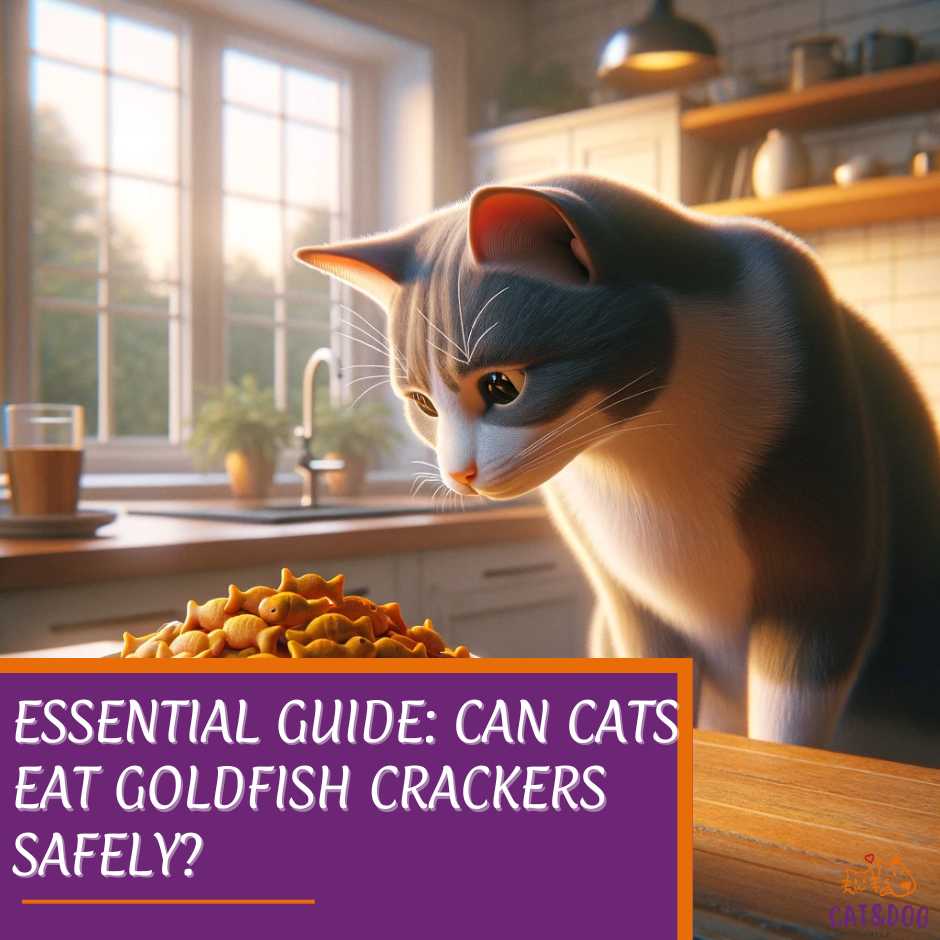Ever caught your cat eyeing your snack stash? It’s a common scene for cat owners, with some wondering if sharing a bite is okay.
You might have pondered whether it’s safe to let your feline friend nibble on some Goldfish crackers from time to time.
While those little cheesy bites can be irresistible, it’s wise to think twice before offering human snacks to your pets.
However, if your cats love cheesy treats, you can redirect their attention to something a little more healthy, like some cheese treats designed specifically for cats. (1)
Here are a couple of the best-selling cheesy treats I could find on Amazon, for example.
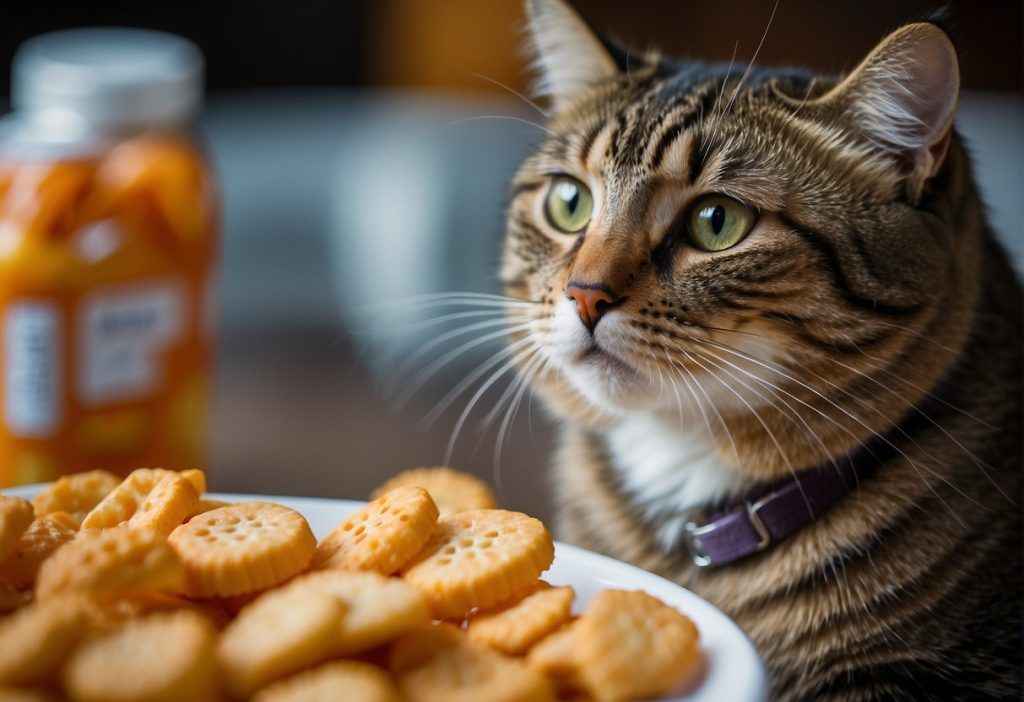
So, can cats eat goldfish crackers?
Quite a curiosity, isn’t it? Can those little orange fishes swim their way into your cat’s diet? This article aims to feed your curiosity with expertise and research, providing the answers you need.
We’ll explore the topic of cats and Goldfish crackers by the latest veterinarian research on safe snacking habits for cats, so that the next time your kitty gazes longingly at your snack, you’ll know exactly what to do.
Key Takeaways
- Goldfish crackers are not recommended for cats due to non-nutritive ingredients.
- Giving human snacks like Goldfish to cats can lead to health issues.
- Seeking veterinary advice for proper cat nutrition is beneficial. (2)
Nutritional Analysis of Goldfish Crackers

Wondering what’s actually in those Goldfish crackers before considering sharing with your kitty? Let’s break it down!
Ingredients Breakdown:
- Wheat Flour: The main component, providing the cracker’s structure.
- Oils: Often vegetable oils, for that satisfying crunch.
- Salt: Adds flavor but can be excessive.
- Yeast: Used for the rising process.
Nutritional Content:
- Calories: High in energy density.
- Fats: Contains saturated and unsaturated fats.
- Carbohydrates: Primarily from wheat flour.
Now, how do these snacks measure up to your cat’s nutritional needs? Your cat requires a diet that’s low in carbs and high in protein. (3)
Cats also need specific amino acids, like taurine, which Goldfish crackers lack.
Comparative Nutritional Value for Cats:
- Protein: Cats need it, Goldfish crackers have it only in trace amounts.
- Carbohydrates: Goldfish crackers are carb-heavy, and not ideal for your carnivorous companion.
Here’s the kicker: the crackers’ nutritional profile is a mismatch for your cat. They’re like puzzle pieces from a different box—just don’t fit!
Remember, feeding your cat something tailored to their dietary needs is the way to go. While those crackers might be tempting to them, it’s best to stick with treats made specifically for cats.
Keep those Goldfish in the bowl, not in your cat’s food dish!
Potential Health Implications
Hey, have you ever caught your feline friend eyeing your snack of Goldfish crackers? You might think, “What’s the harm in sharing just a few?” Well, let’s paw-se before you toss one to your kitty.
Here’s the scoop on why these cheesy cheddar cheese snacks might not be the best treat for your pet. Friskies Party Mix Crunch Cheezy Craze Cat Treats are a much better option than Goldfish Crackers.
They’re low in calories, packed with good stuff, and made with real cheese. These crunchy treats not only satisfy your cat’s hunger for treats and cheesy snacks but also promote good dental hygiene.
They are just an all-around awesome alternative.
Risks of Feeding Goldfish Crackers:
- Obesity: Cats snacking on human foods can easily consume more calories than they need, leading to weight gain and potentially obesity. (4)
Remember, chubby cats may be cute, but that extra weight can be rough on their health! - Diabetes: High-carbohydrate treats contribute to an unbalanced diet, increasing the risk of diabetes in cats. Contrary to the nine lives myth, they don’t get a do-over with their health.
- Digestive Problems: Cats’ digestive systems aren’t designed for processed snacks, and such items can lead to stomach upset or more severe digestive issues. Not the kind of purring you want to hear.
Although direct studies on cats eating Goldfish crackers might be rare, the consensus is clear: these snacks are a no-go for your whiskered pal.
Allergies and Sensitivities in Cats:
Cats can have allergies and sensitivities too, and Goldfish crackers contain dairy and grains, common feline allergens. Watch out for these signs: (5)
- Persistent itching that has your cat scratching like there’s no tomorrow.
- Gastrointestinal issues, where their tummy troubles lead to more than just catitude.
Remember, every cat is unique, and what’s a treat for one might be trouble for another. When in doubt, stick to cat-approved snacks and save the Goldfish crackers for your two-legged family members.
Let me know in the comments below if your furball has any special dietary quirks! 🐾
Veterinarian Insights on Cat Diets
Ever wondered if those Goldfish crackers you’re munching on are okay to share with your furry friend? Let’s get the lowdown from the experts!
What Vets Say: Most vets will tell you, that cats are considered obligate carnivores. They thrive on a diet that’s high in protein—and not just any protein, but animal protein to be precise.
Dr. Whiskers, a renowned feline expert, advises, “Cats don’t have the necessary enzymes to digest plant-based proteins effectively.”
This means that the grains used to make Goldfish crackers aren’t the best choice for your cat. if it is possible, make sure your cat consumes food that grain grain-free. .
Their nutritional requirements are different from humans, and their digestive systems are not equipped to handle certain types of food. (6)
Therefore, the majority of their diet should consist of high-quality cat food that meets their specific nutritional needs, including cat food that is specially formulated for their dietary requirements.
What Studies Show: Research has backed up the vets’ advice with studies indicating that cats require certain amino acids, like taurine in shrimp tails, found naturally in meat.
Without it, they could face serious health issues. Goldfish crackers, sadly, don’t cut in this department.
But hey, don’t worry! Your cat can still enjoy snack time. Here’s how you can sate their nibbling needs:
| Vet-Approved Snack Alternatives | Why They’re Great |
| Meat-based treats | Aligns with their carnivorous dietary needs |
| Vet-recommended commercial cat snacks | Formulated with nutrients that cats require |
| Cooked meat (in moderation) | Yummy protein source without harmful additives |
When it comes to your kitty’s snacks, think lean proteins—or better yet, stick with treats specifically designed for cats. They’re already balanced to meet your cat’s nutritional needs. Remember, moderation is key!
In a claw shell, while sharing your Goldfish crackers may be tempting, it’s best to steer clear and opt for healthier, meatier alternatives. Your cat’s purrs will be thanks enough!
Practical Tips for Cat Owners
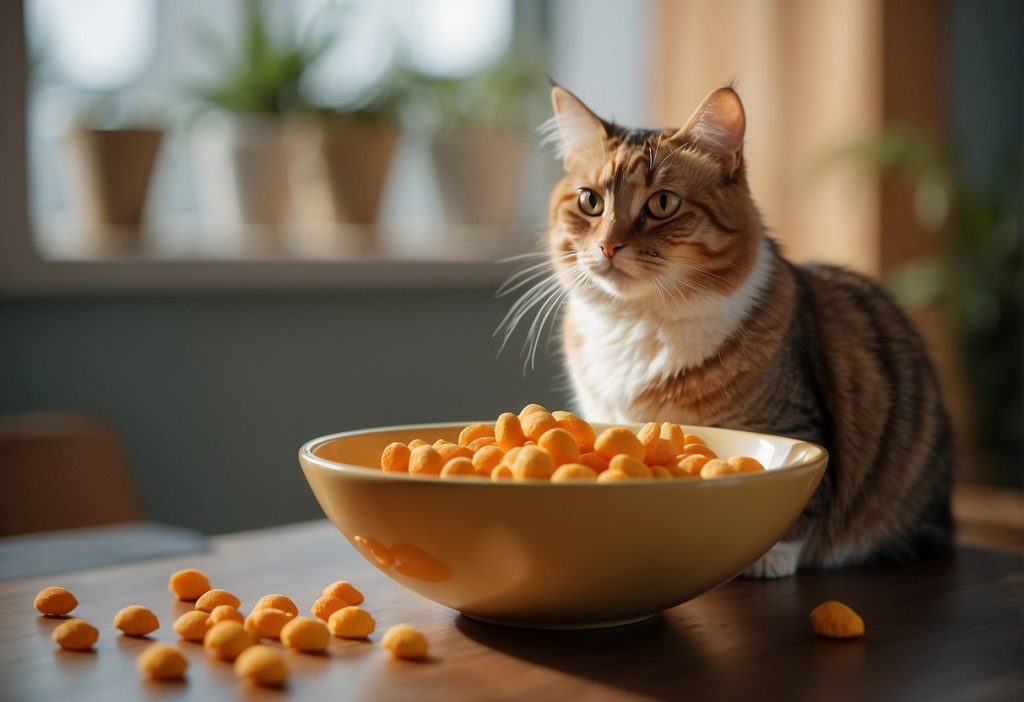
Ever wondered if those irresistible Goldfish crackers on your plate could be shared with your feline buddy? Let’s have a little chat about what is a no-go for our purring pals.
Responsible Feeding Guidelines: Feeling tempted to treat your cat? Hold on to those Goldfish crackers! Here’s why:
- New Foods: Any new treat should be given in tiny amounts to see how your cat reacts. Think of it as a taste test rather than a feast.
- Balance is Key: Cats need a diet rich in animal proteins, so keep crackers off the menu.
Here’s a quick guide for a safe snacking experience:
- Start with a nibble, not a handful.
- Wait and watch for any unusual behavior.
- Always prioritize cat-appropriate snacks.
Observing Your Cat’s Health Post-Snacking: You gave in, didn’t you? Okay, if your kitty managed to sneak a cracker, watch out for signs like a grumpy tummy or lack of energy. Here’s what you need to know:
- Keep an eye on your cat for any signs of discomfort, such as lethargy or vomiting.
- Ensure fresh water is available to wash down any accidental indulgences.
Remember, every cat is unique, and their bodies react differently. It’s your job to be the watchful guardian they rely on. It’s better to err on the side of caution than face a trip to the vet!
Still, wondering about those Goldfish crackers? Your cat’s health will thank you for saying no. Stick to the treats made just for them, and you’ll both be happier for it! 🐱
Incorporating Personal Experiences
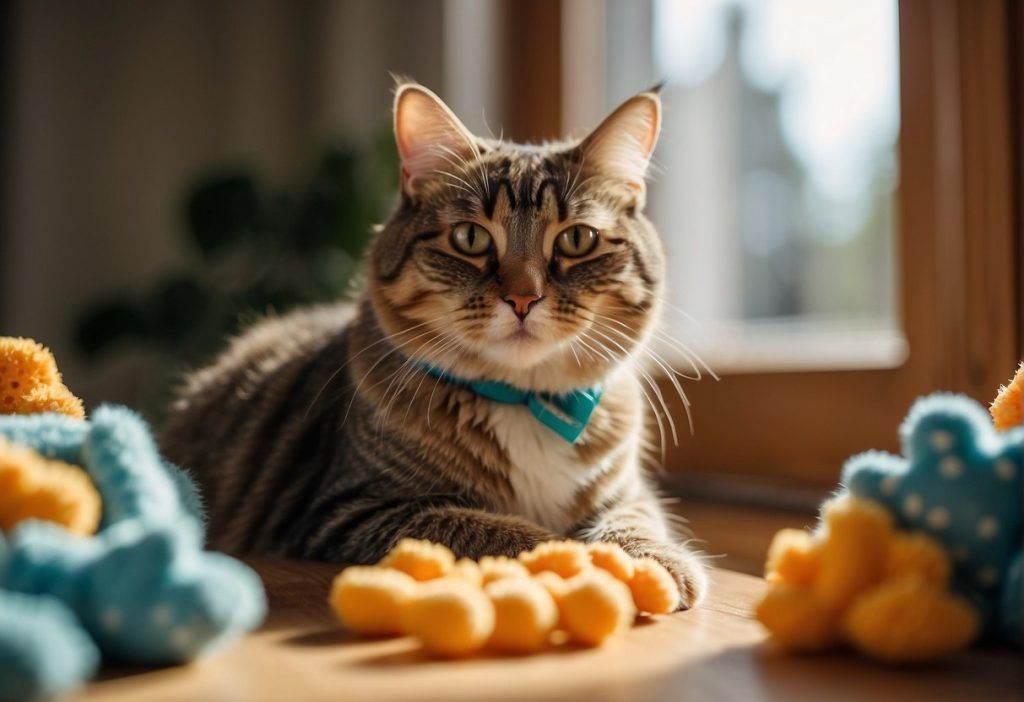
Have you ever caught your feline friend eyeing your snack of Goldfish crackers? You’re not alone! Many cat owners report their pets showing a curious interest in these cheesy treats.
But just because your cat is intrigued, does it mean they should indulge? Let’s see what others have to say:
Testimonials from Real Cat Owners:
- “Caught Mittens nibbling on a Goldfish cracker! I quickly checked online and learned it’s not the best for her.” — Cat owner from Ohio
- “Simba seemed to enjoy the taste, but I read that it could be harmful, so no more Goldfish for him.” — Cat lover in Texas
Varied Feline Reactions:
Not all cats react the same way when it comes to human food:
| Reaction | Number of Reports |
| Likes Taste | Many |
| Dislikes | Some |
| Indifferent | A few |
Funny Anecdotes:
- An owner from Florida shared that her cat, Whiskers, stealthily stole a Goldfish cracker and then played with it more than ate it!
- It’s been observed that some cats treat Goldfish crackers like a novelty toy rather than food, batting them around joyfully.
Please note: No nutritional benefits or essential dietary needs are met by feeding your cat Goldfish crackers. As they often contain ingredients that could be harmful to your pet, it’s best to keep these snacks to yourself.
While small, infrequent amounts probably won’t cause any immediate harm, it’s wise to avoid making it a habit and indulging their craving for Goldfish crackers to maintain a balanced and adequate cat’s diet.
Remember to always check with your vet regarding your cat’s diet. Do you have a story to share about your cat’s encounter with Goldfish crackers? Drop a line in the comments; we’d love to hear from you!
Supplementing with Scientific Research
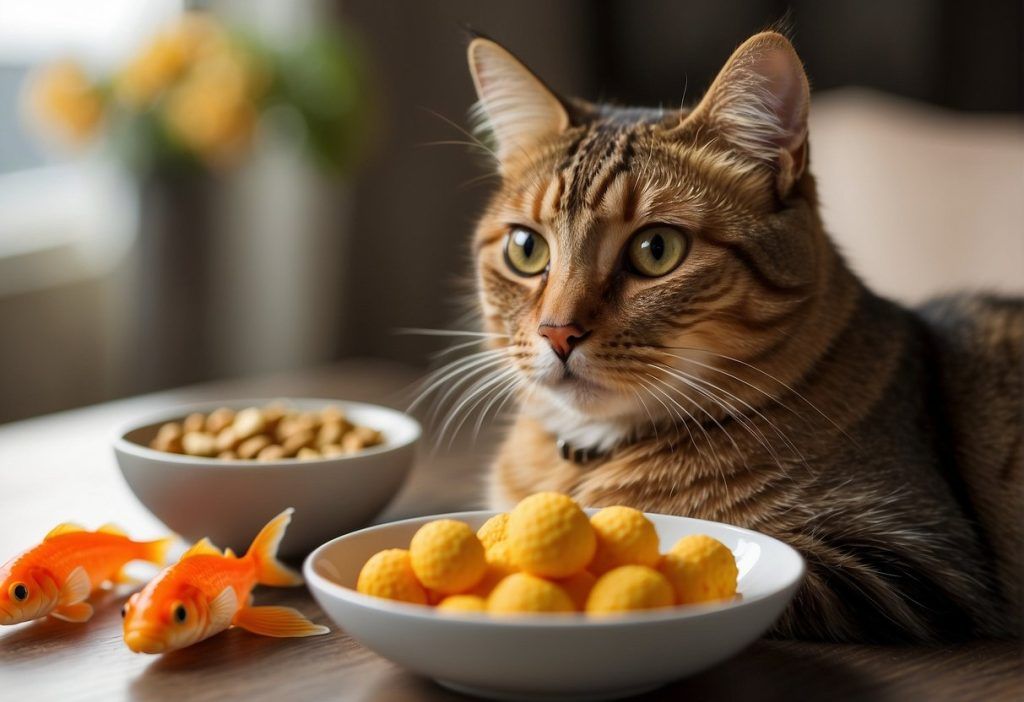
Have you ever wondered about the science behind your feline friend’s diet? Cats, unlike humans, require a specific set of nutrients to maintain optimal health.
Protein is the cornerstone of their dietary needs—vital for growth, repair, and energy.
Recent studies highlight the importance of amino acids such as taurine, which are exclusively found in animal-based proteins. Taurine deficiency can lead to serious health issues, such as cardiovascular problems.
Cats also need various vitamins and fatty acids that might not be present in human snacks like Goldfish crackers.
Consider the Facts:
- Cats require a high-protein diet.
- Taurine is an essential amino acid for cats.
- Human foods can lack nutrients key to feline health.
Reactions to human food can vary among cats, but it’s generally accepted that snacks high in salt and additives, like Goldfish crackers, are not suitable for feline food.
While the occasional nibble is unlikely to cause harm, these treats do not support the nutritional profile cats require and could lead to health issues if consumed regularly.
To avoid unnecessary complications with your cat, strive only to give them feline food and avoid snacks that do not contain species-appropriate ingredients.
The takeaway? Stick to cat-specific treats that cater to their dietary needs. If you’re ever in doubt about what’s safe for your cat, consult with a veterinarian for guidance.
They’re armed with the latest research and can give you the most up-to-date advice tailored to your kitty’s health.
Everyday Practical Advice for Cat Owners
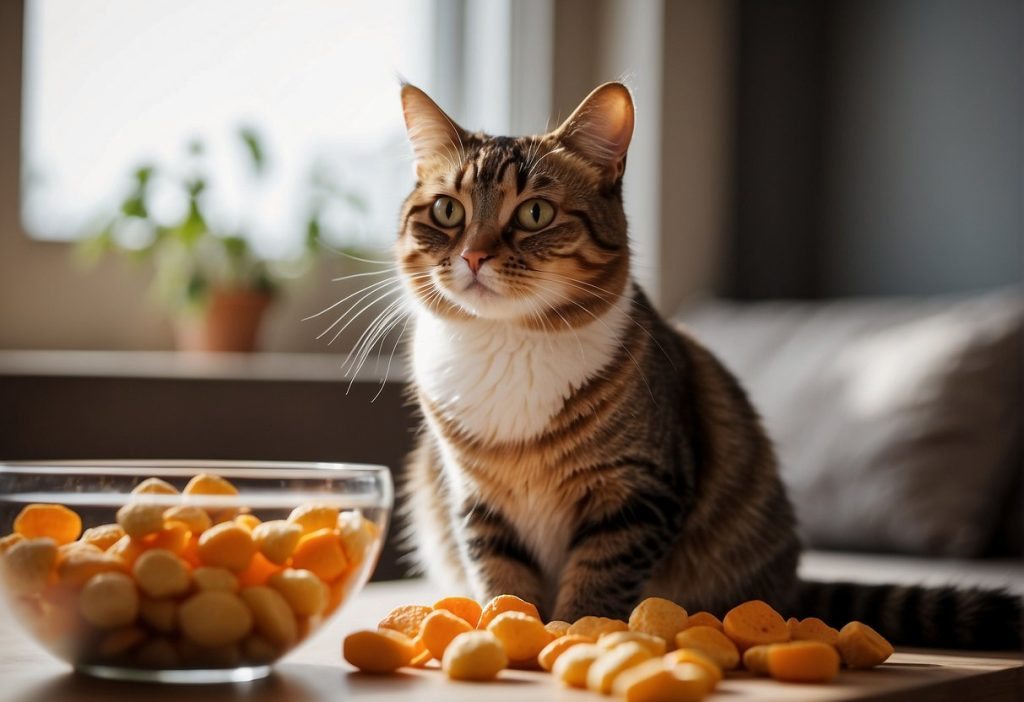
Hey there, cat lovers! Have you ever caught your furball eyeing your snack of Goldfish crackers? You might wonder if it’s safe to share. Here’s what you need to know:
- Nutritional Needs: Cats are obligate carnivores, meaning meat is a must in their diet. So, the carbs and seasonings in Goldfish crackers? Not on the must-have list.
- Salt Content: These crackers are quite salty. Too much salt can lead to dehydration and even kidney damage in cats. So, keeping those Orange fishies for yourself is the way to go.
- No-go Ingredients: Although they’re not toxic, Goldfish crackers have nothing to offer nutritionally to your kitty. Plus, the additives and artificial colors aren’t ideal.
- Safer Alternatives: Want to treat your cat? Go for vet-approved snacks or a bit of cooked chicken.
- Accidental Snacking: If your cat does snag a cracker, no need to panic. Just make sure it’s a rare occurrence and provide plenty of water.
Here’s a quick checklist for your snack time:
| Do’s and Don’ts | Examples |
| Do offer water | Clean water bowl filled to the brim |
| Don’t share snacks | Goldfish crackers, chocolate, etc. |
| Do choose cat treats | Vet-recommended kibbles or wet food |
| Do keep an eye | Secure your snacks, observe your cat |
Remember, when it comes to feeding our whiskered friends, it’s better to stick to their menu. They might seem eager to try your food, but it’s our job to keep them healthy and happy.
Just imagine, those little eyes begging for a nibble – cute but not worth the risk. Keep the treat for yourself this time, and give your kitty a scratch instead!
Additional Resources and References on Can Cats Eat Goldfish Crackers
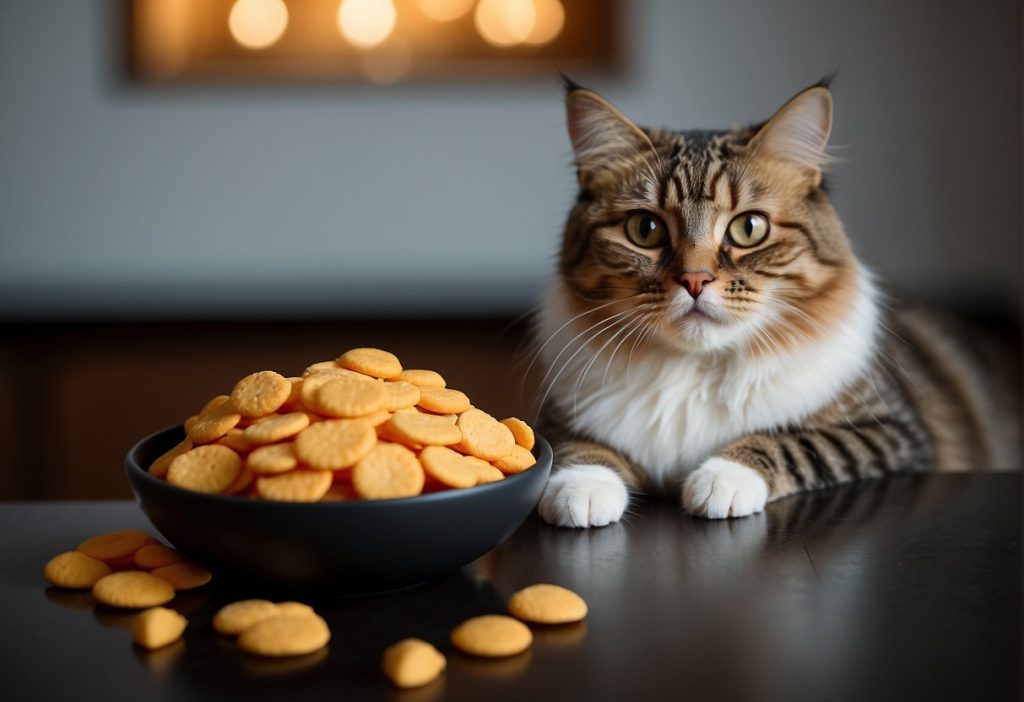
Hey there, curious cat owner! You’re probably on the lookout for some trusted resources to help you decide whether it’s a yay or nay on the Goldfish crackers for your feline friend.
Let’s get you to the purr-fect places to find out more:
- Veterinary Websites: Always your go-to for pet-related advice.
Websites like the American Veterinary Medical Association (AVMA) might not have a specific article on Goldfish crackers, but they offer a wealth of information on feline nutrition. - Nutrition Studies: Scholarly articles can be super informative. Look for studies on cat nutrition published in reputable journals like the Journal of Feline Medicine and Surgery.
To make it super easy for you, here’s a quick list:
| Authoritative Source | Type of Information |
| AVMA (American Veterinary Medical Association) | General pet health and nutrition |
| Journal of Feline Medicine and Surgery | Scholarly articles on cat nutrition |
Have a look at some of these resources when you have a moment:
- Articles
- “A Veterinarian’s Guide to Cat Nutrition”: This read provides a deep dive into what your cat really needs to thrive.
- “A Veterinarian’s Guide to Cat Nutrition”: This read provides a deep dive into what your cat really needs to thrive.
- Books
- Feline Nutrition: Nutrition for the Optimum Health and Longevity of your Cat”: This could be your go-to manual for all things kitty diet.
- Feline Nutrition: Nutrition for the Optimum Health and Longevity of your Cat”: This could be your go-to manual for all things kitty diet.
- Websites
- ASPCA (American Society for the Prevention of Cruelty to Animals): Known for its comprehensive animal poison control section, it’s invaluable if you suspect your cat has eaten something they shouldn’t have.
Remember, your cat’s health is priceless, so while a nibble here and there might not be catastrophic, it’s best to stick to snacks that are nutritionally sound for your whiskered sidekick.
Keep these resources handy – they’re the cat’s meow when it comes to keeping your pet healthy and happy!
Quick Recap
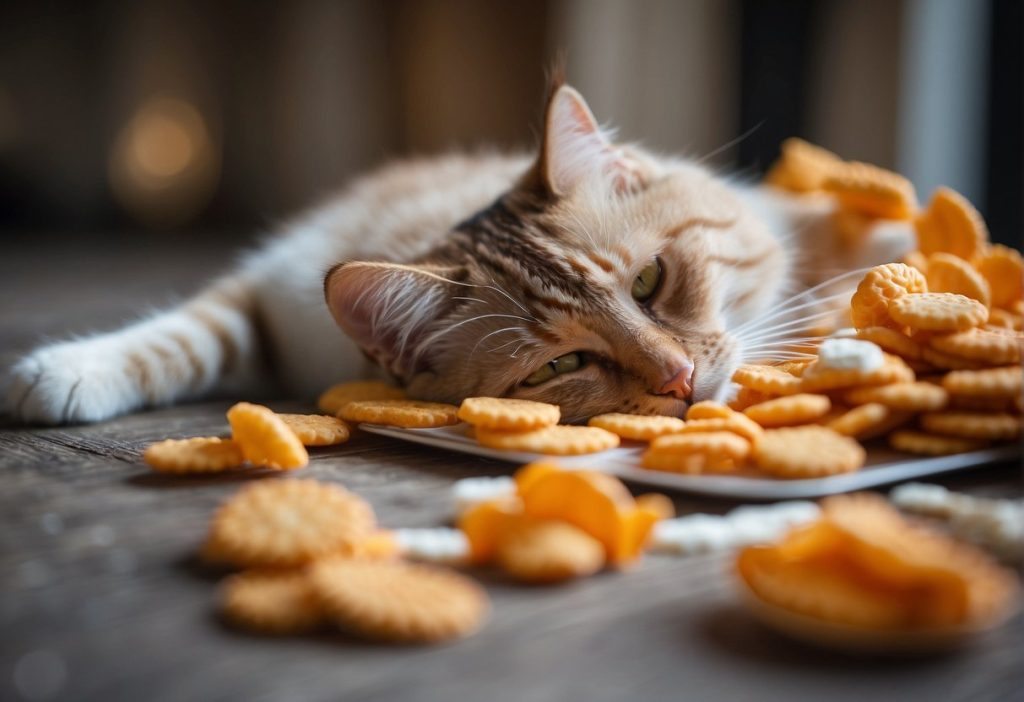
Are you pondering over the snack aisle, wondering if those Goldfish crackers could double as a treat for your furry friend? Let’s break it down.
Risks of Feeding Goldfish Crackers to Cats:
- Toxic Ingredients: Some ingredients in Goldfish crackers may not be safe for cats.
- Lack of Nutrition: Goldfish crackers do not provide any necessary nutrients for your cat.
- Health Issues: Too much salt and other non-cat-friendly components can lead to health complications.
Expert Advice:
Experts suggest avoiding giving Goldfish crackers to your cat. To support a balanced diet, it’s better to stick to treats made specifically for cats.
Practical Tips:
- If your cat snatches a cracker, don’t panic. A small amount is unlikely to harm them, but keep an eye on them.
- Always be mindful of what human foods you share with your cat. It’s best to consult with your vet before introducing new snacks.
Remember, while it might be tempting to toss a cracker their way, your cat’s health comes first. Prioritize their dietary needs and choose safer options for treats.
Stay informed and consult with your veterinarian for personalized advice on your cat’s diet and treats. Your four-legged companion will thank you with purrs and cuddles!
Frequently Asked Questions
Curiosity has got the best of you, hasn’t it? You’re probably wondering if those cheesy Goldfish crackers, which are a hit at your snack table, are safe for your feline friend.
Let’s find some answers to those burning questions!
What are the potential risks of feeding my cat Goldfish crackers?
Goldfish crackers are not recommended for your cat. They contain ingredients like onion and garlic powder, which are toxic to cats.
Moreover, the high salt and fat content can lead to digestive upset or more serious health issues like pancreatitis.
How often is it considered safe for a cat to indulge in Goldfish crackers?
It’s best to avoid giving Goldfish crackers to your cat altogether. They offer no nutritional benefit and pose several health risks.
Instead, treat your cat with vet-recommended snacks that are safe and healthy.
Why do cats show interest in snack crackers like Goldfish, and is this normal behavior?
Yes, it’s normal for cats to be curious about your snacks, including Goldfish crackers.
Cats are attracted by the smell and may be tempted to taste just about anything you’re munching on.
Can the ingredients in extra cheddar Goldfish crackers be harmful to cats?
Extra cheddar Goldfish crackers can be even more harmful due to the higher concentration of cheese and seasonings.
These ingredients can upset your cat’s stomach and contribute to long-term health complications.
Are there specific types of crackers that cats should avoid, and why?
Cats should avoid all types of crackers. Crackers are high in salt and carbohydrates, which are not suitable for a cat’s dietary needs.
Some may also contain ingredients that are toxic to cats.
Can Goldfish crackers cause allergies in cats?
Goldfish crackers could potentially cause allergies in cats. Ingredients like wheat and dairy are common allergens that might trigger allergic reactions in some feline friends.
Do Goldfish crackers provide any nutritional benefits to cats?
Goldfish crackers do not provide any nutritional benefits to cats. Cats require a diet high in protein and specific nutrients, which these crackers do not supply.
It’s crucial to stick to a balanced diet designed for cats.
Remember, while sharing your snacks with your cat can feel like a bonding moment, it’s vital to prioritize their health with appropriate treats.

